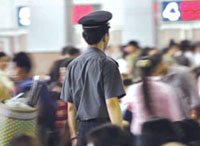
A handful of policemen patrolling the Chengdu North Railway Station in this capital of Southwest China's Sichuan Province were recently arrested for colluding with thieves to earn ill-gotten money.
From 2003 to early this year, 17 police officers were found to have turned a blind eye to law violations by a 16-member gang active at the station, and even offered them protection after receiving bribes, according to the Chengdu Railway Police Bureau.
Since last June, the gang began to deposit money into these police's bank accounts, instead of giving the officers cash face-to- face, as bribes. Between last December and this January, a total of more than 80,000 yuan (US$9,600) was deposited.
After the police-gang collusion was uncovered, nearly 240,000 yuan (US$29,000) of ill-gotten money was confiscated from the accused police, and one of the officers was found to own more than 1 million yuan (US$120,000) a big sum of cash with no identifiable source, said Ren Xiaohua, a Chengdu Railway Police Bureau investigator.
The corrupt officers would have continued their easy money-making process but a complaint letter from a serviceman led to their downfall, the bureau said.
On January 10, the serviceman, who took a train from Chengdu to Xi'an, capital of Northwest China's Shaanxi Province, found his purse stolen in the railway station's lounge. Inside there was 1,800 yuan (US$217) in cash, a train ticket and some bank cards.
After reporting the case to the railway police, the serviceman was about to leave the station with the intention of borrowing money from a fellow serviceman in the city. Right before he left, he spotted a thief stealing someone's purse at the entrance of the lounge.
Amazingly, after grabbing the purse, the thief handed two purses to a police officer on duty in the baggage office. One of the purses belonged to the serviceman. All of this was observed by the serviceman.
The serviceman tracked down the thief and caught him red-handed. Yet the policeman in the luggage office only returned his purse, and let the thief get away with the crime. The angry serviceman sent a complaint letter to Chengdu Railway Police Bureau, suspecting that the policeman and thief were co-horts in crime.
Receiving the letter, the Chengdu railway police started an investigation. On February 23, the police found that not a few officers at the station were allegedly colluding with the gang, which is mainly composed of members from Yibin .
More than two months later, the biggest scandal within the city's railway police bureau was cracked wide open.
The gang of 16 thieves from Yibin was apparently well organized. Some members were in charge of stealing while others transferred stolen money and belongings. They rented houses in the city and hired cooks and housekeepers.
Wang Mou, the gang's alleged boss, started stealing at the Chengdu North Railway Station in the early 1990s. After offering bribes to four station police officers, he kept his feet there and formed the gang.
According to Wang, the gang offered a bribe of 400 to 600 yuan (US$48 to 72) each time they entered the railway station's lounge. Whenever a thief stole 500 to 1,000 yuan (US$60 to 121), he would give half the sum to the police.
After a thief was caught, the policemen would pretend to help the passenger, comforting him. But after the passenger left, they would destroy the record and let the thief walk away, Wang said.
As one of China's eight largest railway stations, Chengdu North Railway Station handles a daily average of about 70,000 passengers. Like any other large stations, the Chengdu station attracts both passengers and criminals.
To cope with the mounting pressure for public security, Chengdu Railway Police Bureau set up a police station in the Chengdu North Railway Station to oversee its booking office, lounge and platforms.
When the scandal was made known, the police station had less than 110 staff members. Even though only 17 were brought to court in the end, about 50 were found to be involved in the scandal and are being investigated.
According to Xie Zhengdong, an information officer with Chengdu Railway Police Bureau, the police station has changed its chief.
Among its existing 108 staff members, 40 are new graduates from police schools from different parts of the country and many others have transferred in from other police stations of the Chengdu Railway Police Bureau.
Xie explained that one reason for the scandal is the lack of supervision of the railway police station. Fifteen of the thieves from Yibin have been caught, Xie said, with one still at large.
(China Daily May 25, 2005)
|

